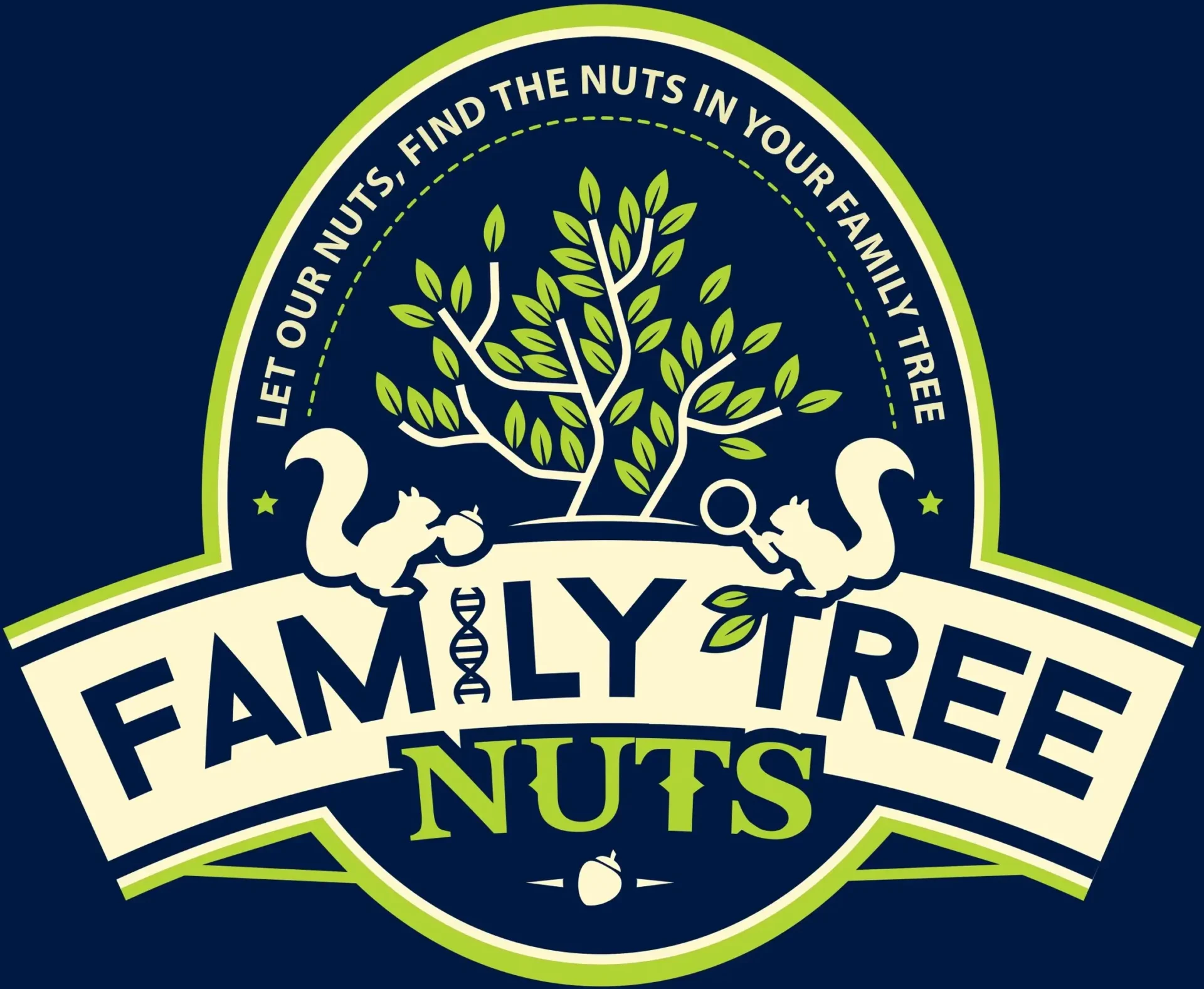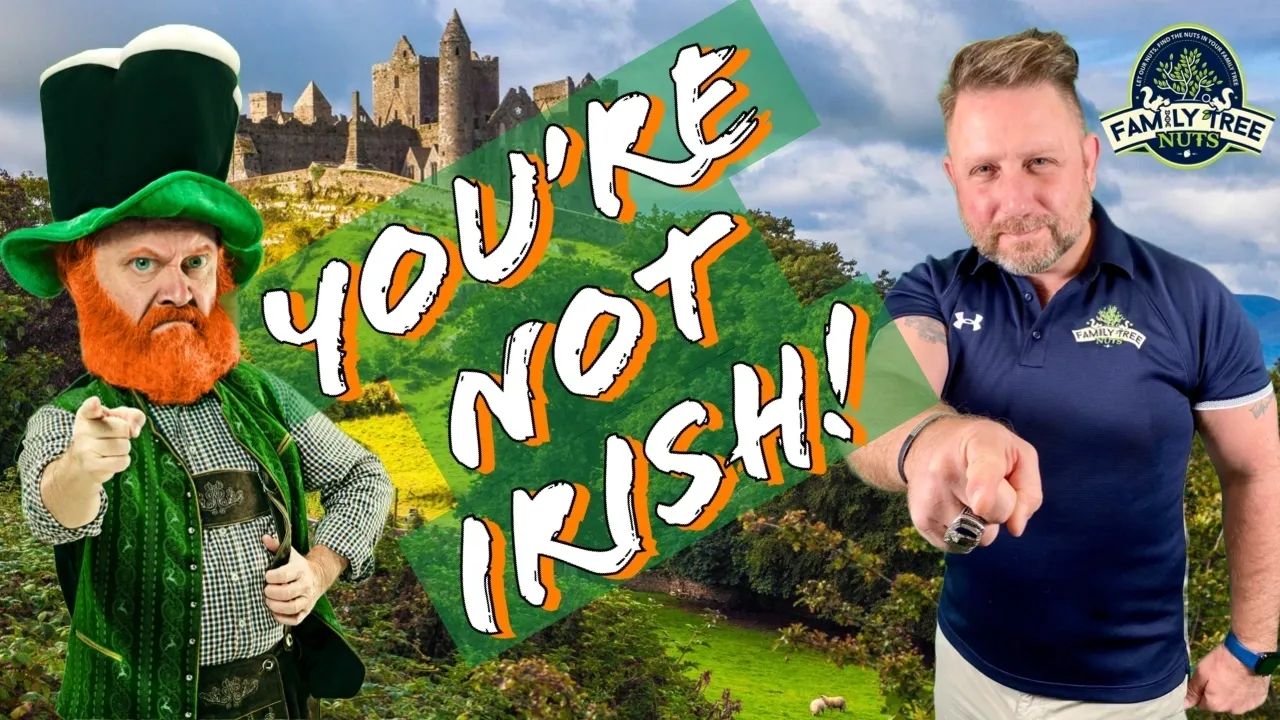
NO! You are NOT Irish! History of a big myth in genealogy!
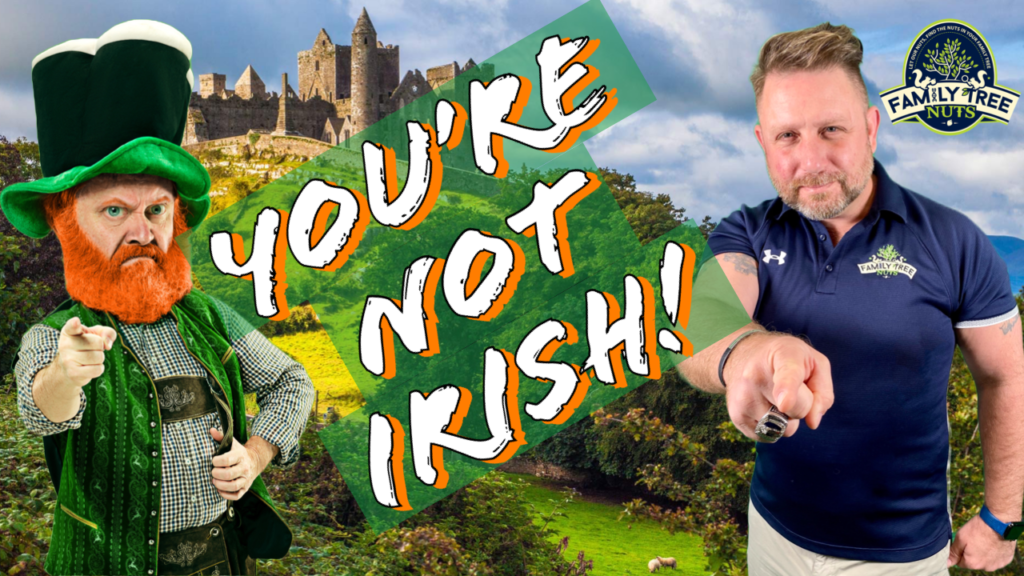
NO! You are NOT Irish! You aren’t a child of Erin, you don’t have the “Luck of the Irish”, and you can’t blame that temper of yours on Irish roots. When Americans are asked what their ethnicity is, millions of us list Irish first. Why is that? Where did this misconception come from? So, if you aren’t Irish, then what are you? In this article, I’ll explain my point, and a little about the migrations of Irish immigrants to America and why so many of us have been told incorrectly all our lives that we are Irish. By the way, you’re not Cherokee either, so be sure to see our article about that topic as well.
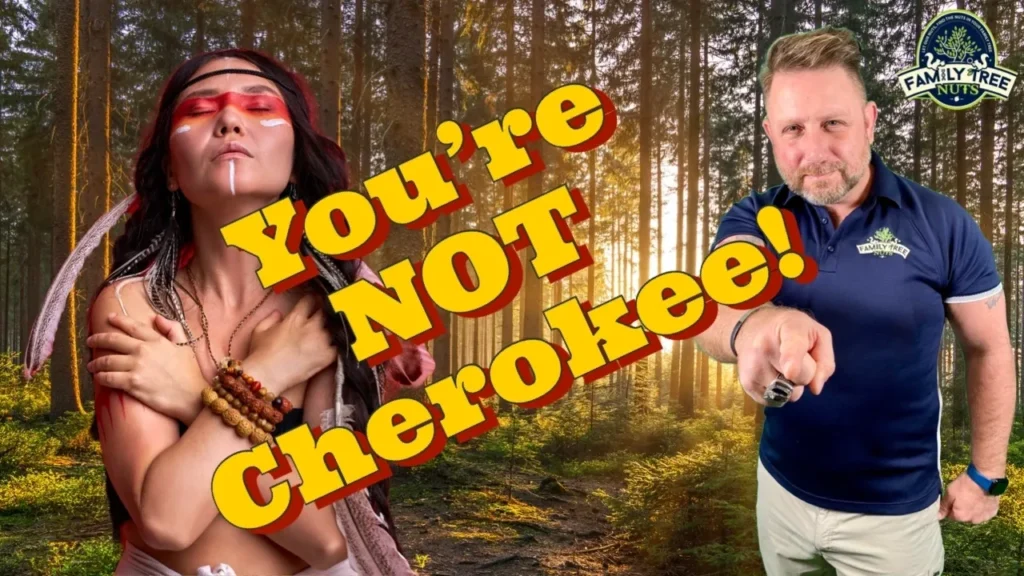
Before I get too deep in this article, I guess I need to state the obvious. Of course, some of you ARE Irish. Some of you, or your close ancestors were born there. Some of you have done your family trees and discovered your Irish ancestors names and maybe even where in Ireland that they came from. This article is not aimed at you, it is aimed at those that have been told that they are Irish, assumed it, or simply just wanted to be Irish. Hopefully by the end of this article you will have a deeper understanding of what you are and where your ancestors came from.
So, what is “Irish” anyway? For the sake of keeping this article short and on topic, I’ll sum it up quickly. The Irish are a group of people from distinct Celtic tribes that due to geography and politics have remained less ethnically diverse than other areas that Celtic people once dominated. They are ancient Celtic cousins with the Scottish, Welsh and even the Briton’s that ruled modern day England before the Romans and later the Germanic Angles and Saxons arrived. To understand the Irish relation to other Celtic peoples, think of the tribes Shawnee and Cherokee, which are ethnically very similar but with different traditions, cultures and heritages.
With a strong sense of identity, geography, politics, and religion, the Irish have remained an ethnicity that has evolved over the centuries. But how Irish are the Irish? According to ancestryDNA, most Irish in Ireland are less than 75% Irish themselves, leaving the remaining 25% or so to other ethnic groups. In Ulster, that number shrinks down to close to 50%. Shew, statistics like this can get confusing, so I’ll get back on the main topic.

To better understand the chances of you having Irish roots, you not only need to know the story of your ancestors, but also when and where the Irish came to America. For the first century of settlement in the New World, hardly any Irish immigrated to America, and almost all the Irish that did immigrate during this time period settled in the Boston area or in the Chesapeake Bay area in Maryland. However, by the year 1715, only about 1% of New England or Maryland were Irish. After 1715 and until the time of the Revolutionary War, America was blessed with waves of tens of thousands of “Irish” immigrants. Except, they weren’t really Irish, they were Scots-Irish. I’ll get into the Scots-Irish later in this article.
The next wave of Irish immigration was the time of the dreaded Irish Potato Famine. During the mid 1840s until the early 1850s hundreds of thousands of Irish left the shamrock shores of Ireland and immigrated all over the world, many of them to America, especially to the Boston area. By the mid 1850s the population of Boston was estimated to be about 25% Irish, with 85% of them being born in Ireland.
Another wave of Irish immigration happened in the 1880s due to economically hard times in Ireland. Many of these immigrants took jobs building the railroads that were quickly connecting the country. And some became coal miners, often in Western Pennsylvania, and other regions in Appalachia. The point of explaining these Irish immigration waves is to show you that if you don’t have ancestors linking to these time periods and locations, the chances of you being Irish yourself is drastically diminished. It’s not impossible of course, just highly unlikely.
When I was a boy I asked my mom, where are we from, what are we? The first thing she mentioned was Irish, and I declared Saint Patrick’s Day as my favorite holiday. However, as I got older and did my research, I confirmed that I was Irish, but it was on my father’s side, not my mothers. Why did she think that she had Irish roots? Well, my roots go deep in Appalachia and like I already explained, understanding the immigration waves, dates, patterns, and where groups settled, gives us a tremendous clue of our ethnicity.
The fact is, my mother is mostly Scots-Irish, as is my father for that matter. However, the family stories that were passed down said that we were Irish, not Scots-Irish, why is that? What is the difference between Scots-Irish, and “regular Irish”? Well, to fully explain that would make this article quite long, but we do have a few other articles and videos that discuss the topic in detail, so you may want to check those out as well.
I’ll sum up the Scots-Irish as fast as I possibly can. Beginning in the early 1600s, for many reasons, Great Britain, under the leadership of Kings James I, began to relocate many Lowland Scots, and some English that lived along the tumultuous border of Scotland and England. These people were mostly Protestant and had a warrior culture due almost continuous fighting in the region that they were from. They were relocated to Northern Ireland and became known as the Ulster Scots. This group of people clashed with the mostly catholic local Irish. The two groups constantly fought each other but they also intermixed and married each other. Over a few generations, they became a new group of people that we refer to today as the Scots-Irish. After a century or so, the people began to think of themselves as Irish, and less Scottish or English. Their customs became more traditional Irish, even though some of them weren’t ethnically Irish at all.
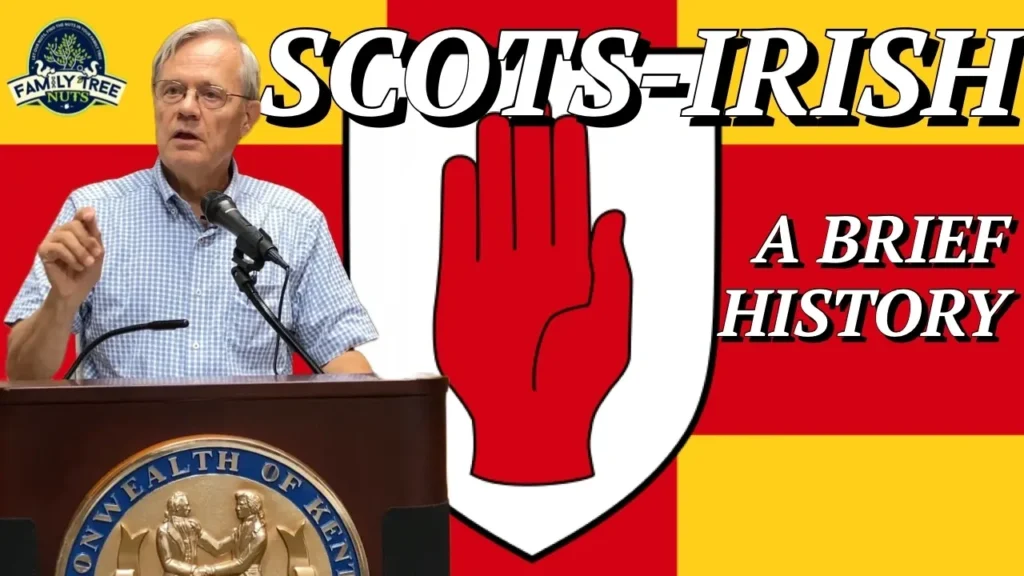
In the early 1700s this group of people were heavily recruited to settle in the back country of the British Colonies to serve as a buffer between the native tribes and the English settlements. Their hardy and warrior culture made them a perfect fit for their new home. Like every other ethnic group, the Scots-Irish did spread out all over the map, but they concentrated into Appalachia. These folks would have told their descendants that they were Irish, not Scots-Irish because that term wasn’t used until much later. This is where the stories like my mother told me about being Irish are from!
So now that we know where those stories come from, are we that are mostly Scots-Irish, Irish? Yes, we certainly are, but we are also Scottish and English. We are our own specific kind of Irish, that is much different than those immigrants that came a century later during the potato famine and those that came in the 1880s to work on the railroads and in the coal mines.
So now we have learned that many that think they are Irish, aren’t Irish at all, or more commonly are technically Scots-Irish, why is it that so many want to be Irish? Why is it that so many of us list Irish first when we talk about our ethnic background? Well, the answer is actually the same reason that so many of us claim Cherokee ancestry. We are simply drawn to and hope to relate to the struggle.
For centuries the Irish have been discriminated against in the British Empire. Their often refusal to assimilate into British society has caused them to be exploited and even enslaved. Many of us have never been told how the Irish were often thought of as a subspecies of humans and how businesses used to display “NINA signs” which were “Help Wanted, No Irish Need Apply”. Like many Native Americans or other races, the Irish often hid their roots. As a matter of fact, one of my 3rd great-grandfathers always reported his parents as being born in Pennsylvania until he was in his late 60s, where on the 1920 Census he finally reported them as being from Ireland and his mother’s native tongue as being Irish.
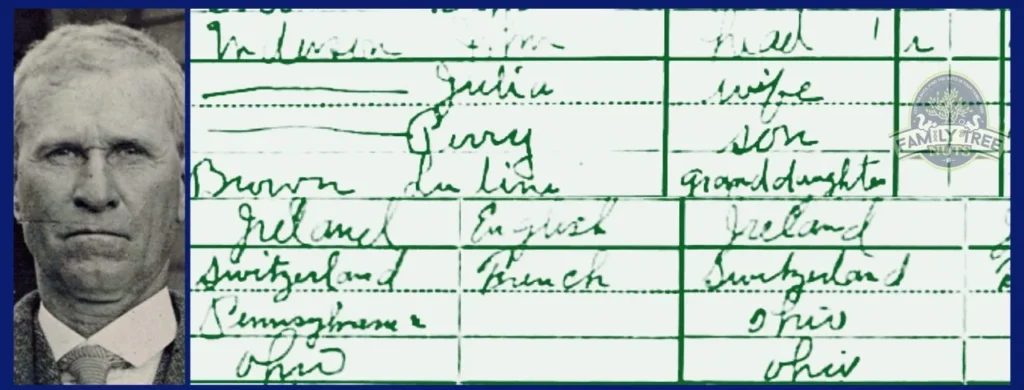
For some reason we as humans are attracted to what is often called the “Lost Cause”. It’s similar to why it’s said that many people want to relate to the Confederate States, Native American Tribes, Poor Hillbillies, or even the Civil Rights Movement for some. We have a longing and a desire to relate to those who struggled and overcame, more than we do to those that had it easier. I encourage everyone to do the research or have someone like me do it for you to discover your ancestors and where they came from. Only then will you truly know.
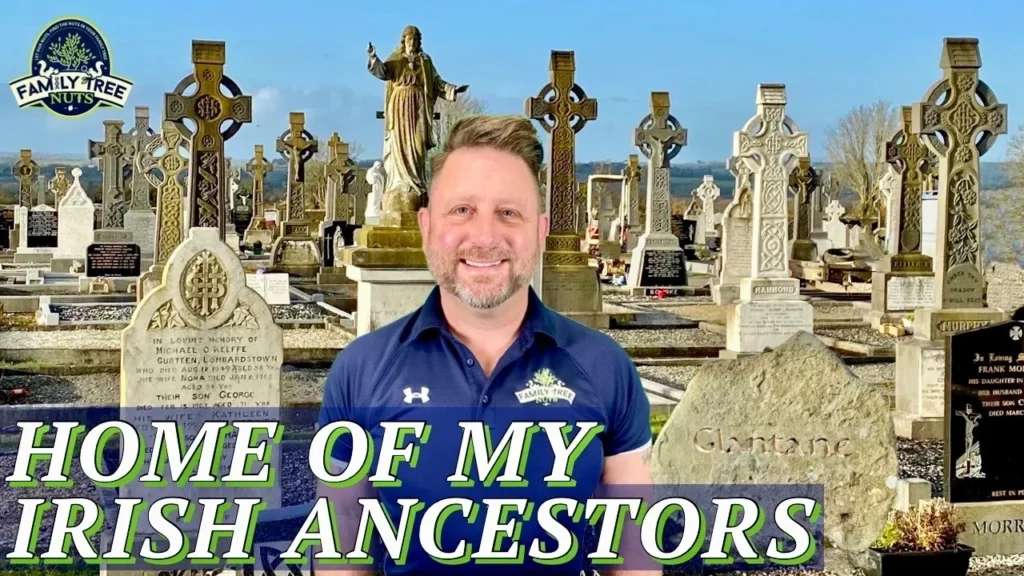
I know that I have contradicted myself a few times in this article. I told you that you weren’t Irish. I’ve told you that you were Irish, and I’ve even told you that you are kind of Irish. So, which is it? Each one of us must find out the truth for ourselves and if you conclude that I was right and you don’t have any Irish roots, well, I think I speak for most when I say that we’d be glad to have you celebrate with us anyway. Especially on Saint Patrick’s Day! If you are lucky enough to discover your Irish ancestors and where they come from, I hope you get to visit their hometowns like I was lucky enough to do. Visiting the map dot town that my direct male ancestor immigrated from, was one of my most cherished and powerful experiences. I of course documented it in a video.
So, what do you think? Now that I have busted so many peoples bubble about their false Irish roots, I’m curious to hear your thoughts. I’m confident that many of you will refuse to buy into what I’ve said and will look for ways to refute it. So many of us have heard the myth of being Irish all our lives, and literally get depressed when we find out that we don’t have a drop of anything but English, Scottish or even German blood. Just because someone wants to be Irish, doesn’t make them Irish. No more than me wanting to be a billionaire, makes me one. Like I said earlier, be proud of who you are, and all your ancestors. Find ways to celebrate them and they will become your true identity. Be sure to see the video below.
-Col. Russ Carson, Jr., Founder, Family Tree Nuts
